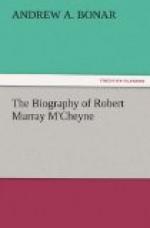At Balteen, a small village in Egypt, I well remember the indignation that fired his countenance, when our Arab attendants insisted on travelling forward on the Sabbath-day, rather than continue sitting under a few palm-trees, breathing a sultry, furnace-like atmosphere, with nothing more than just such supply of food as sufficed. He could not bear the thought of being deprived of the Sabbath rest; it was needful for our souls as much in the wilderness as in the crowded city; and if few glorify God in that desolate land, so much the more were we called on to fill these solitudes with our songs of praise. It was in this light he viewed our position; and when we had prevailed, and were seated under the palms, he was excited to deep emotion, though before quite unnerved by the heat, at the sight of a row of poor wretched Egyptians who gathered round us. “Oh that I could speak their language, and tell them of salvation!” was his impassioned wish.
An event occurred at that time in which the hand of God afterwards appeared very plain, though it then seemed very dark to us. Dr. Black fell from his camel in the midst of the sandy desert, and none of all our company could conjecture what bearing on the object of our Mission this sad occurrence could have. Is it a frown on our undertaking? or can it really be a movement of his kind, guiding hand? We often spoke of it: in our visit to Galilee we thought that we saw some purposes evolving; but there was still something unexplained. Now, however, the reason appears: even that event was of the Lord, in wise and kind design. But for that fall, our fathers in the deputation would not have sailed up the Danube on their way to Vienna, and Pesth would not have been visited. This accident, which mainly disabled Dr. Black from undertaking the after fatigue of exploring Galilee, was the occasion of directing




